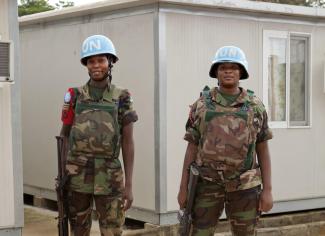Global Governance
Self-perpetuating cycles of violence
 Esteves/picture-alliance/ZUMA Press
Esteves/picture-alliance/ZUMA Press
The “Pathways for Peace” report was written on behalf of the World Bank and UN. It warns that violence is one of the greatest obstacles that may block achievement of the 17 SDGs (Sustainable Development Goals). The researchers insist we need peaceful societies – and that is made more difficult by challenges such as climate change, inadequate cyber security or transnational organised crime. The World Bank and UN point out that civil wars are very costly – and not just in a financial sense. For the international community, it is cost-effective to prevent such violence.
The study finds that violence hits low-income countries particularly hard. At current trends, more than half of the world’s poorest people will live in countries with a high level of violence by 2030. The researchers offer a number of explanations for states failing and societies becoming mired in violence for long periods. As the report authors argue, conflicts are triggered by:
- economic crises,
- suffering of marginalised population groups,
- changing social norms,
- availability of arms, or
- change of regime or sometimes merely government.
The report identifies various types of civil war – ranging from revolutions to genocidal ethnic conflicts. Economic crises are not seen as a cause of conflict but they put pressure both on political systems and people, often making mobilisation to violence more likely.
According to the World Bank-UN publication, the number of intra-state conflicts has steadily increased since 2010. Various kinds of non-state organisations are said to play a major role, mobilising extremists, militants and rebels – but also criminals such as human traffickers for example. They spread ideologies and syphon off economic or political resources. Social media and other online platforms serve to fuel anger and hatred. They are also used for recruitment purposes. At the same time, the authors point out that IT tools can also serve preventive action.
Inter-state conflicts have become rare, the study concludes, but private funding makes intra-state conflicts more complicated. Violence disrupts trade, potentially reducing the supply of food and other essential goods. Shortages are likely to trigger inflation. Conflict in one country, moreover, often affects neighbouring countries too.
The study finds that countries beset by violent conflict fail to sustain the development progress they have already made. They are also more susceptible to epidemics. Social trust is eroded – both between citizens and towards institutions. Social services typically break down because of conflict.
Even after a conflict is over, the consequences are felt for generations, the authors warn. In their view, renewed outbreaks of supposedly settled disputes are likely to cause huge problems.
Calling for prevention, of course, is easier than implementing effective action. The World Bank and the UN note that risks must be recognised and assessed properly. There is a need for institutional reforms, and conflict parties must be involved in shaping them. Successful reforms reduce high spending on military operations and emergency aid. The international community is therefore well-advised to provide support geared to strengthening fragile states before conflicts escalate.
The World Bank-UN study shows that many countries are under intense pressure from global transformations which include climate change and digitalisation. National shortcomings in regard to education and health care are worrying, not least because frustration fuels aggression. On the upside, crisis prevention can break cycles of violence. More cooperation at national, regional and global level can make it work.
LINK
United Nations, World Bank, 2018: Pathways for peace: inclusive approaches to preventing violent conflict.
https://openknowledge.worldbank.org/handle/10986/28337
Florian Gaisrucker
was an intern with D+C/E+Z at the last quarter of 2019.
euz.editor@dandc.eu
